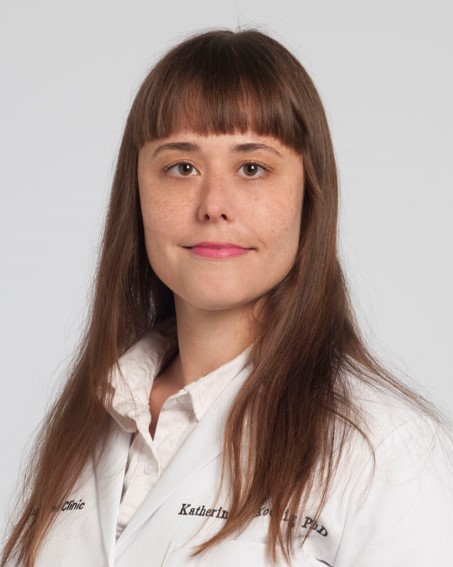
Early Investigator, REC
Katherine A. Koenig, PhD
Assistant Professor
Cleveland Clinic Lerner College of Medicine, Case Western Reserve University
Assistant Staff, Imaging Institute, Cleveland Clinic
Research Education Component
Can you please tell me about your role in the CADRC?
I am one of the trainees under the Research Education Component. My work uses MRI to study neurodegenerative diseases, until recently focused mostly on Multiple Sclerosis. I also have an interest in Down Syndrome (DS), and am benefiting from the additional training related to Alzheimer’s disease (AD) and DS through the ADRC.
Can you please tell me what key questions your research is intended to answer?
My ADRC-supported project focuses on individuals with DS. They tend to be diagnosed with Alzheimer’s-type dementia at an earlier age than the general population due to an extra copy of chromosome 21. Chromosome 21 includes genes that increase amyloid-beta in individuals with DS, even in very young people. By age 60 about half of individuals with DS will have dementia. We know that all individuals with trisomy 21 have increased amyloid and AD neuropathology. So the disconnect is that even though all individuals with Downs have the neuropathology related to Alzheimer’s, not all of them get dementia. A lot of them do, but not all. From autopsy studies we know these younger individuals have the neuropathological correlates of Alzheimer’s disease without showing signs of dementia. So what I’m looking for are specific biomarkers in MRI scans that will tell us who with DS is at risk of converting to Alzheimer’s or maybe point to some kind of protective mechanism.
Is there anything besides the connection with DS that drew you towards dementia research?
DS was the main thing. I have been doing my own small scale Down syndrome research for a while, so it’s good to get support to take that to the next level and collaborate with people doing other types of analysis.
Can you tell me a little bit more about how the ADRC has been helpful towards your research?
The main thing is being able to collect longitudinal data. MRI measurements can tell us about future dementia status, however it requires a longitudinal component. I had already done imaging in a sample with Downs cross-sectionally, and the ADRC is allowing me to bring these individuals back for longitudinal testing. As far as the educational component, I recently took a neuropathology course at Case through the ADRC that was really helpful in understanding the cellular mechanisms related to dementia. And also collaborating with the other researchers in the ADRC has been really helpful.
Looking at your career as a whole, what do you think has been the most helpful?
I think working with supportive senior researchers who give you opportunities and guide you into spaces where you can follow your research interests, with helpful connections. Senior researchers that take an interest in your work and help you move forward is probably the most important thing.
What does the future of dementia research look like to you?
To me, one big problem, not just in DS and dementia, but in developmental disability research in general, is that it’s really difficult to do accurate behavioral or cognitive testing. It is hard to determine when somebody is progressing from their typical state to dementia since it is so hard to get good, solid measures of their cognitive abilities in the first place. It is also hard to determine how dementia shows up because everything we know about dementia is modeled on a typically-functioning person. For example, in lower functioning people with developmental disabilities, it is rare for them to have a subjective cognitive complaint. Saying, “I don’t feel like I can remember very much anymore,” may not be something a lower functioning person can verbalize or even recognize. The cognitive tests that we use to assess dementia in the general population are not applicable to people with developmental disabilities, making it hard to diagnose dementia in somebody who has developmental disabilities. That’s partly because of the available tests and partly because individuals with developmental disabilities have a wide range of functioning; there is no test that fits everyone. My point is to recognize the movement happening now, that I think will only get stronger, towards using biomarkers to recognize a biological definition of dementia. That would be particularly helpful in DS because it is so hard to tell if someone is developing dementia or if some other issue is causing the changes. So I think the biological definition of dementia is something that is going to continue to be really prominent.
My last question is if there is anything you think my questions didn’t touch on or you wished you had mentioned previously, anything you would like to add at this point.
I know in the developmental disabilities world, research is often very personal. For example, I have a sister with Downs. And I think it is like that for a lot of people in dementia research as well; they get into it because they have a personal interest in it. That means a lot of people in the field are very passionate about it because they have seen the personal devastation it causes first hand.
